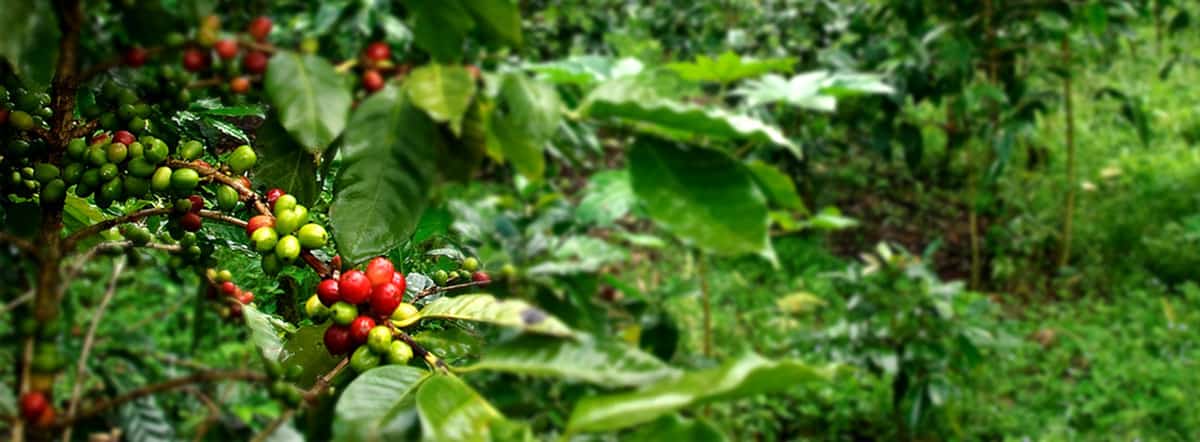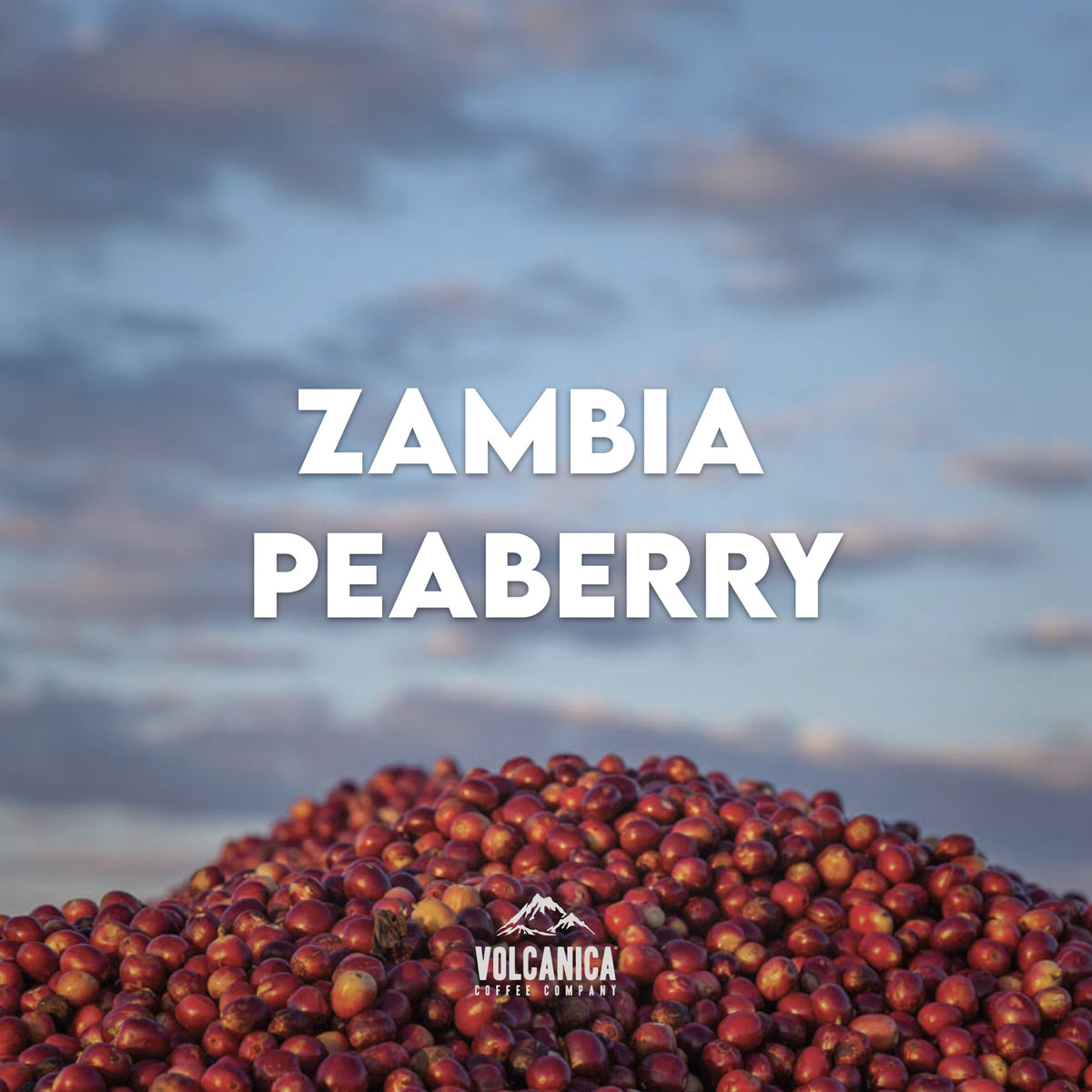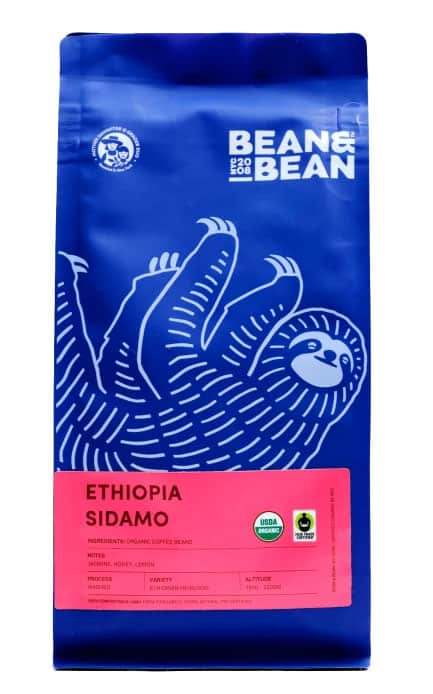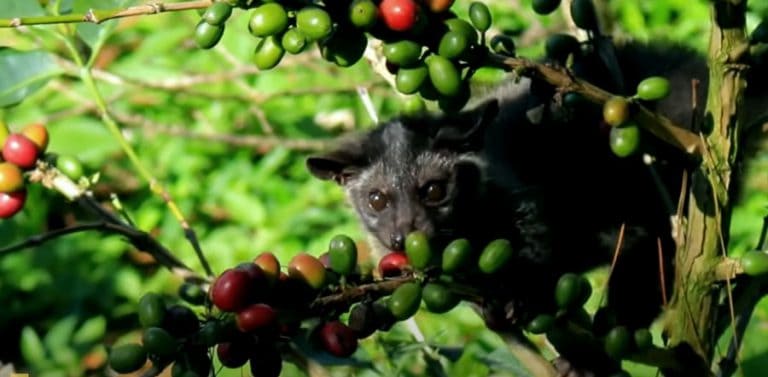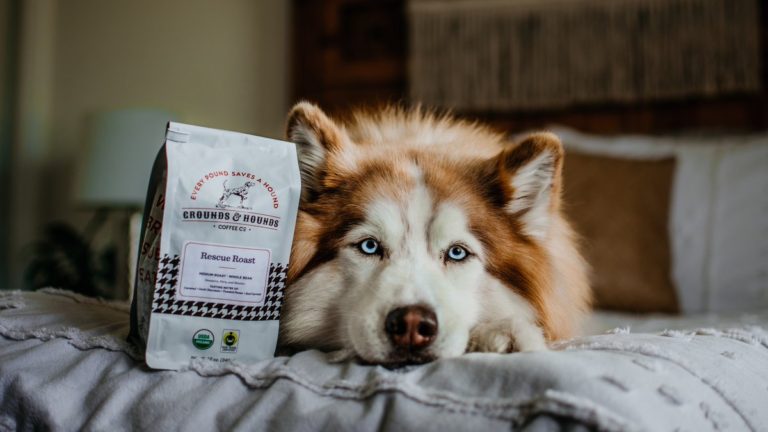5 Great Shade Grown Coffee Beans You Should Try
If you love coffee, you probably know that not all coffee beans are created equal. Shade-grown coffee beans have a lot of advantages over sun-grown ones: They are more ethical, sustainable, and delicious than their counterparts.
But which ones should you get?
In this article, I will show you my list of the 5 best shade-grown coffee beans in 2024 that you should definitely try. You will also learn how to choose the right beans for your taste and preference if you’re shopping around, and why it matters for the environment.
Keep reading as we’ll discover the best-tasting shade-grown coffee beans.
Top 5 Shade-Grown Coffee Beans in 2024
If you’re reading this post, I’m sure you know that shade-grown coffee simply refers to coffee sourced from plants that are grown under the shade of trees. This is in contrast to sun-grown coffee, which is easier and faster to grow and harvest, but leads to deforestation and other environmental issues.
Choosing shade-grown beans is an environmentally conscious choice on your part, that’s great! Below are my top recommendations:
| Name | Certifications/Memberships | Roast | Sizes | Flavor | |
|---|---|---|---|---|---|
| 1. | Jamaican Blue Mountain Coffee – Clifton Mount Estate | 100% certified by JACRA, Direct Trade certified, Kosher certified, & Rainforest Alliance certified | Medium roast | 16 oz, 3 lbs, & 5 lbs | Balanced, fruity, with chocolate and floral notes |
| 2. | Zambia Peaberry Coffee | Kosher Certified & Rainforest Alliance Certified | Light to medium roast | 16 oz, 3 lbs, & 5 lbs | Bright, fruity, with cherry, almond, and raspberry notes |
| 3. | Colombia Felipe Arcila Orange Velvet | Shade-grown coffee | Light roast | 3 oz only | Concentrated and complex with notes of maple syrup, red apple, caramel, vanilla, and white chocolate |
| 4. | 100% Hawaii KONA Natural Whole Bean Coffee | Kona coffee is always shade-grown, Bird Friendly, and fairly traded | Medium roast | 8 oz & 1 lb | Rich with fruit notes and aromas, less oily |
| 5. | Bean & Bean Ethiopia Sidamo | Sidama Coffee Farmers Cooperative Union (SCFCU) | Light to medium roast | 11 oz, 3 lbs, & 5 lbs | Elegant and delicate with chocolate, caramel, white wine, floral, honey, and lemon notes |
1. Jamaican Blue Mountain Coffee, Clifton Mount Estate – Volcanica
Volcanica Coffee’s Clifton Mount Estate Jamaican Blue Mountain Coffee is a great choice if you seek premium, single-estate coffee.
Cultivated at the renowned Clifton Mount Estate, this bean offers a harmonious blend of flavors with a balanced profile featuring prominent fruit notes and light acidity, all wrapped in a strong and intense aroma. Recognized as one of the world's finest coffees, it is meticulously dried on concrete slabs in the famed Blue Mountains of Jamaica, a region with a rich history of coffee production dating back to the 18th century.
With a full flavor, this medium roast coffee offers a nice balance and prominent fruit flavors, providing a rich and satisfying taste. The caramel and milk chocolate aroma is crisp, while the sweet and delicate taste is rather shallow and lean, with a pleasant dry nutty chocolate character.
Certified by the Jamaica Agricultural Commodities Regulatory Authority, Direct Trade, Kosher, and Rainforest Alliance, this coffee has impressive balance and no bitterness, with the perfect harmony of chocolate, floral, and fruity notes.
Pros
Cons
Jamaican Blue Mountain Coffee – Clifton Mount Estate Product Specifications:
- Source: Clifton Mount Estate in Jamaica’s Blue Mountains
- Certifications: 100% certified by Jamaica Agricultural Commodities Regulatory Authority (JACRA), Direct Trade certified, Kosher certified, & Rainforest Alliance certified
- Roast: Medium roast
- Sizes: 16 oz, 3 lbs, & 5 lbs
This farm produces consistently great coffee, and has been awarded over and over again.
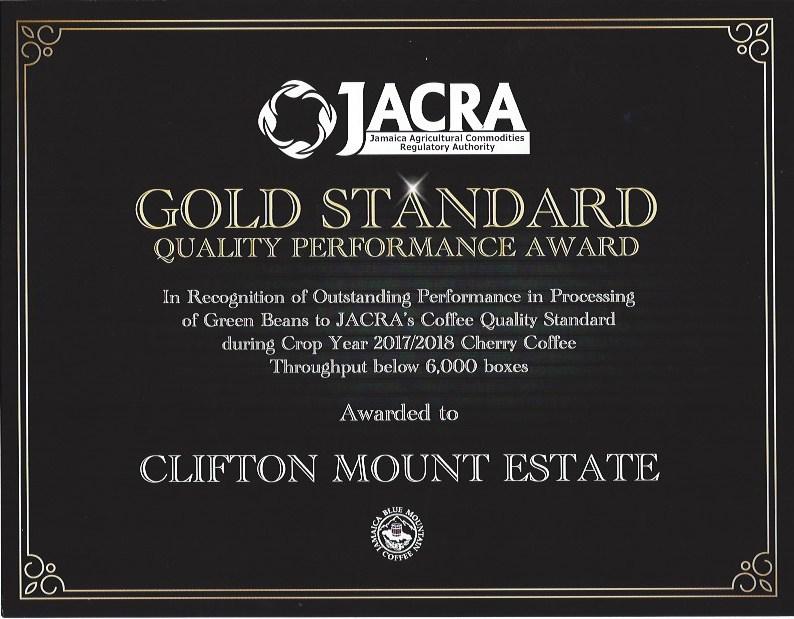
2. Zambia Peaberry Coffee – Volcanica
This Zambia Peaberry Coffee from Mafinga Hills is a unique and delicious coffee that showcases the best Zambian coffee-growing regions.
The Zambia Peaberry from Mafinga Hills is a unique, washed coffee made from Castillo variety beans, showcasing a bright and clean flavor profile with notes of cherry, lime, almond, lemon candy, and raspberry. This Rainforest Alliance-certified coffee is a result of an anomaly in which the coffee cherry produces a single, round seed, resulting in a concentrated and intense flavor. The Zambia Peaberry coffee is a medium-light roast that offers a sweet and well-balanced cup, perfect for those who appreciate a bright and fruity coffee experience.
What sets it apart from other coffees is that it’s made up of only peaberries, an anomaly in which the coffee cherry produces a single, round seed rather than the typical flat-sided two seeds. This is why you can taste a more concentrated, intense flavor from this coffee.
Bursting with juicy cherry and lime notes, along with hints of almond, lemon candy, and raspberry, you’d love sipping on this sweet and well-balanced coffee if you appreciate a bright, fruity cup.
Pros
Cons
Zambia Peaberry Coffee Product Specifications:
- Source: Mafinga Hills in Zambia
- Certifications/Memberships: Kosher Certified & Rainforest Alliance Certified
- Roast: Light to medium roast
- Sizes: 16 oz, 3 lbs, & 5 lbs
3. Colombia Felipe Arcila Orange Velvet – Volcanica
The Colombia Felipe Arcila Orange Velvet is a unique and delicious coffee produced by Felipe Arcila on the Jardines Del Eden farm.
This Private Estate coffee, cultivated by Felipe Arcila on the Jardines Del Eden farm in Colombia, is known as 'Orange Velvet' due to its unique processing method. Through a 72-hour dry anaerobic fermentation process, combined with the addition of peaches and wine yeast, this coffee offers a distinct flavor profile. With flavor notes including maple syrup, red apple, caramel, vanilla, and white chocolate, it presents a rich and complex taste experience, earning an 87.5 SCAA rating.
This private estate coffee undergoes dry anaerobic fermentation for 72 hours, with the cherries pulped and dried on raised beds where peaches were placed among them until the ideal moisture content was achieved. This process results in a concentrated and complex flavor profile.
Each cup delivers notes of maple syrup, red apple, caramel, vanilla, and white chocolate. This light roast coffee is available only in a 3 oz size, making it a rare and exclusive treat for coffee lovers.
Pros
Cons
Colombia Felipe Arcila Orange Velvet Product Specifications:
- Source: Jardines Del Eden in Colombia
- Certifications/Memberships: Shade-grown coffee
- Roast: Light roast
- Sizes: 3 oz only
4. 100% KONA Natural Medium Roast Whole Bean Coffee – Koa Coffee
Koa Coffee‘s 100% Kona Natural Medium Roast Whole Bean Coffee is a premium Hawaiian coffee that has been naturally processed to retain the characteristics of the coffee cherry, resulting in delicious fruit notes and aromas that provide an exceptional cup.
This is a premium 100% Kona Coffee that undergoes natural processing to preserve the coffee cherry's fruit notes and aromas. This process involves sun-drying the coffee beans in their cherry skins, allowing them to ferment and absorb natural sugars and nutrients. The result? A unique sensory experience with a smooth mouthfeel and robust fruit notes. A must-try for coffee enthusiasts.
The medium roast coffee was grown at an elevation of 500 to 3,000 feet above sea level, offering a big, rich flavor that allows you to taste the Big Island Kona coast’s recent volcanic past. If you’re using superautomatic espresso machines, this bean that has less oil can brew a really great cup.
Pros
Cons
Koa Coffee – 100% KONA Natural Medium Roast Whole Bean Coffee Product Specifications:
- Source: Kona Island in Hawaii
- Certifications/Memberships: Kona coffee is always shade grown, bird friendly, and fairly traded
- Roast: Medium roast
- Sizes: 8 oz & 1 lb
5. Ethiopia Sidamo – Bean & Bean
Bean & Bean‘s Ethiopia Sidamo is a delightful coffee produced by the family-owned farms of the Telamo Cooperative, with all the elegant and delicate flavors that characterize Ethiopian coffee (read more about it here).
Bean & Bean Coffee Roasters' Ethiopia Sidamo offers a medium roast with tasting notes of florals, spice, and ripe fruit. Sourced from the Sidama region of Ethiopia and processed using the washed method, this coffee embodies the dedication of Bean & Bean to quality and gender equity in the coffee industry.
Indulge in its complexity of flavors that include chocolate, caramel, and crisp white wine with this light to medium roast coffee. This product offers you a refreshing cup with a slight acidity that is elevated by floral notes and hints of honey and lemon.
Pros
Cons
Bean & Bean Ethiopia Sidamo Product Specifications:
- Source: Sidamo region in Southern Ethiopia
- Certifications/Memberships: Sidama Coffee Farmers Cooperative Union (SCFCU)
- Roast: Light to medium roast
- Sizes: 11 oz, 3 lbs, & 5 lbs
Shade Grown Coffee Buyer’s Guide
You can now make your pick among these great options but if you really want to go into details when making the best choice that would suit your palate, here are the things you should look for when buying shade-grown coffee:
- Certifications – Look for certifications such as Rainforest Alliance or Bird Friendly. These certifications ensure that the coffee was grown under a canopy of trees, providing habitat for birds and other wildlife.
- Origin of the coffee – Different regions produce different flavors, so it’s important to find a coffee that suits your taste. For example, Ethiopian coffees tend to have fruity and floral notes, while Colombian coffees are known for their chocolatey and nutty flavors.
If you’re someone who enjoys exploring different coffee flavors and nuances, I highly recommend trying shade-grown coffees from different regions. Each will offer a unique taste experience that reflects the soil, climate, and biodiversity of its growing region – a concept known as ‘terroir’ in the coffee world. - Roast level – Light roasts preserve more of the coffee’s natural flavors and caffeine, while dark roasts have a bolder taste. I tend to favor the middle road of medium roast nowadays.
For me, a big part of the joy in drinking coffee is the journey of discovering new flavors. Don’t be afraid to experiment and ones that resonates with your taste buds.
Why Choose Shade-Grown Coffee Over Sun-Grown Coffee?
So what’s the difference between shade-grown and sun-grown coffee? What makes the former better than the latter?
As its name suggests, sun-grown coffee is grown in full sun, often in large monoculture plantations. This method of farming sometimes leads to deforestation, which results in a loss of habitat for wildlife.
On the other hand, shade-grown coffee is grown under a canopy of trees, which presents a number of benefits:
- They provide habitats for migratory birds and other wildlife.
- The trees help prevent soil erosion
- They provide natural fertilizer for the coffee plants so shade-grown coffee farms may use fewer chemicals and pesticides.
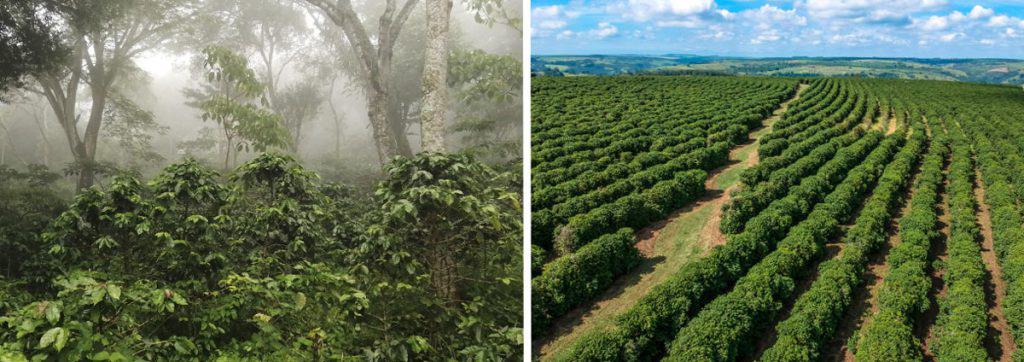
But the benefits of shade-grown coffee don’t stop at the ecological matters. Studies also suggest that shade-grown coffee also has a richer taste than those grown under the sun.
When comparing the two, it’s obvious which one is the better choice. Not only for you but for the environment as well.
Read my in-depth guide on shade-grown coffee to learn more about the many benefits of purchasing and drinking shade-grown coffee.
Frequently Asked Questions (FAQs)
Here are some of the frequently asked questions regarding shade-grown coffee:
Like USDA Organic, Fair Trade, and Rainforest Alliance Certified, Bird Friendly is a certification awarded to coffee brands and their products. It is created by the Smithsonian Migratory Bird Center (SMBC) to certify shade-grown organic coffee.
A coffee’s acidity level depends on factors such as soil type, altitude, and processing methods, but not sun exposure. Up till this date, I’m not aware of any scientific findings that prove that coffee grown under the shade is less acidic.
Yes, shade-grown coffee is generally more expensive as the growing process requires extra maintenance. Shade-grown is also more difficult to harvest than sun-grown coffee.
Each of the shade grown coffee beans above offers unique flavors that cater to different taste buds while also supporting environmentally friendly farming practices and nature.
Grab yourself a bag or two of the beans above, and enjoy guilt-free sipping knowing you’re doing your part for our planet too.
And please let me know how you liked them in a comment.

